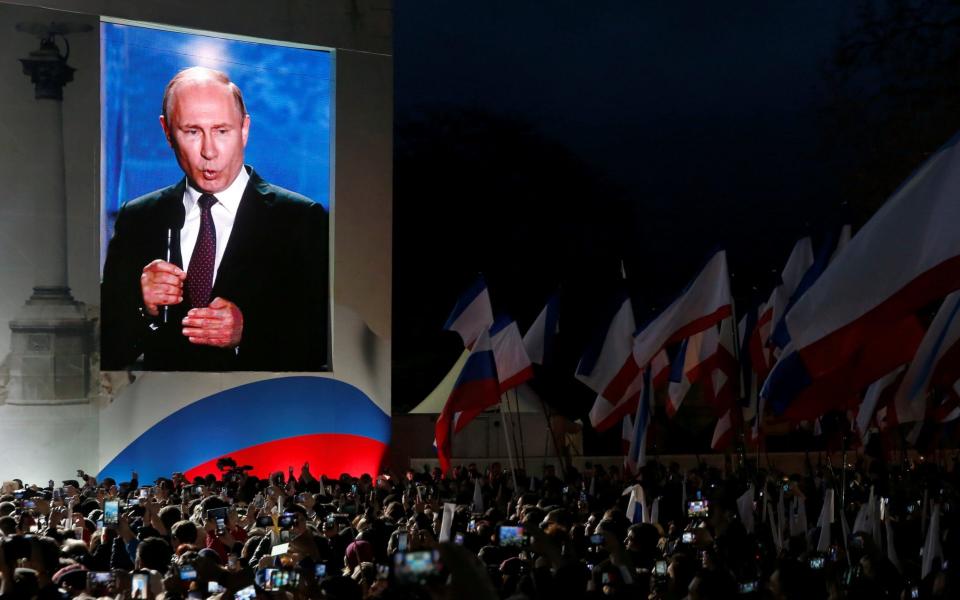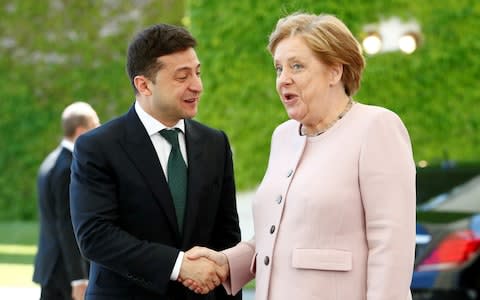Ukraine urges Council of Europe not to lift Russia ban

Ukraine has warned that the Council of Europe will lose all legitimacy if it restores voting rights to Russia, in what would be the first case of penalties on Moscow being lifted since the annexation of Crimea.
The Strasbourg-based body, which upholds humans rights laws in Europe, is expected to vote to let Russia back into the fold on Monday, when members of the parliamentary assembly (PACE) will give a final decision.
The Telegraph understands that both France and Germany are in favour of Russia being handed back its voting rights, which were stripped after the 2014 annexation amid an international outcry.
But Kiev is increasingly concerned that restoring voting rights to Russia would amount to a whitewashing of its conduct and undermine the Council of Europe. "I cannot go into the details, but if this happens Ukraine will consider the Council of Europe as a discredited institution that has lost its authority to mentor member states, and to mentor Ukraine," Dmytro Kuleba, Ukraine's envoy to the Council of Europe, told the Telegraph.
"What we have here is not diplomacy, it is the surrender of the Council of Europe."
It comes after foreign ministers from the Council of Europe's 47 member states reached agreement to end the years-long dispute with Russia in May, with the vote at the Parliamentary Assembly in Strasbourg the last remaining hurdle. Volodymyr Zelensky, the president of Ukraine, raised the issue with French president Emmanuel Macron and German Chancellor Angela Merkel earlier this month.

However, both countries have indicated that they would prefer the Council of Europe to reinstate the voting rights of Russia, which currently sits only as an observer.
Russia's parliamentary delegation to PACE was stripped of its voting rights in April 2014 following the annexation of Crimea. Moscow responded to the suspension of voting rights in 2017 by halting its membership payments, which left a sizeable hole in the Council of Europe's budget.
It has also skipped meetings of the body. Advocates of the compromise argue Russian membership of the Council of Europe is important because it means Moscow is subject to the European Convention on Human Rights, allowing Russian citizens a valuable recourse to justice in cases of abuse by the state.
The European Court of Human Rights has passed more than 2000 judgements on human rights violations by Russia since 1959 - more than another Council member except Turkey.
But critics, including Ukraine, say it would signal that Europe is no longer serious about punishing Russia for its annexation of Crimea and on-going involvement in a five-year war in Eastern Ukraine. More than 10,000 people have been killed since the war in Donbas began.
Last week Dutch investigators announced murder charges against four men, including three Russians with links to the military and intelligence services, over the shoot down of Malaysian Airlines flight MH17 by a Russian missile which killed 298 people.
The agreement adopted by foreign ministers in May was passed by a qualified majority. Britain said it joined a consensus with other ministers, although it was reported the UK opposed the decision along with Poland, Georgia, Estonia, Latvia and Lithuania. It is unclear how the UK delegation will vote on Monday.
